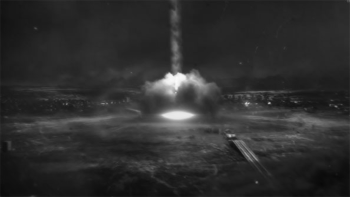Ardclach Orbital Strike: Difference between revisions
mNo edit summary |
mNo edit summary |
||
| Line 38: | Line 38: | ||
The '''{{PAGENAME}}''' was an incident that occurred on 12.IV.1656 [[shire:Norton calendar|AN]], during the [[War of Lost Brothers]] and which marked the second occasion in which weapons deployed from orbit, in this instance the [[NSS Damocles]], had been used against a terrestrial target, in this instance ship-repair facilities and military installations established by the [[New Zimian War League]] in the settlement of Ardclach, located in the [[The Green|ungoverned regions]] of Northern Keltia. | The '''{{PAGENAME}}''' was an incident that occurred on 12.IV.1656 [[shire:Norton calendar|AN]], during the [[War of Lost Brothers]] and which marked the second occasion in which weapons deployed from orbit, in this instance the [[NSS Damocles]], had been used against a terrestrial target, in this instance ship-repair facilities and military installations established by the [[New Zimian War League]] in the settlement of Ardclach, located in the [[The Green|ungoverned regions]] of Northern Keltia. | ||
Authorisation for the strike had been [http://hub.mn/forum/viewtopic.php?f=114&t=8836#p92697 given] weeks previously but had been deferred to allow for a fortuitous conjunction of climatic and meteorological conditions. | Authorisation for the strike had been [http://hub.mn/forum/viewtopic.php?f=114&t=8836#p92697 given] weeks previously but had been deferred to allow for a fortuitous conjunction of climatic and meteorological conditions. The rationale for the strike had it's genesis actions of the Stripping Path and their chemical attack in St.Andre, under the assessment that Passio-Corum actively colluded in its planning and supplied the [[WM17|agent used]]. | ||
Munitions deployed consisted of four kinetic ''"kill vehicles"'', GPS guided tungsten rods, deployed from an altitude of 410 km by the Damocles, which had assumed a geosynchronous orbit, maintained artificially by the platform's gravimetric stabilisers, over the target site on the night previously. | Munitions deployed consisted of four kinetic ''"kill vehicles"'', GPS guided tungsten rods, deployed from an altitude of 410 km by the Damocles, which had assumed a geosynchronous orbit, maintained artificially by the platform's gravimetric stabilisers, over the target site on the night previously. | ||
Revision as of 23:53, 7 January 2018
| Orbital strike on Ardclach | |||||||
|---|---|---|---|---|---|---|---|
| Part of War of Lost Brothers | |||||||
 Artistic rendering of the moment of impact |
|||||||
|
|||||||
| Belligerents | |||||||
| Units involved | |||||||
| |||||||
| Strength | |||||||
| 1 Damocles-class orbital bombardment platform | |||||||
| Casualties and losses | |||||||
The Ardclach Orbital Strike was an incident that occurred on 12.IV.1656 AN, during the War of Lost Brothers and which marked the second occasion in which weapons deployed from orbit, in this instance the NSS Damocles, had been used against a terrestrial target, in this instance ship-repair facilities and military installations established by the New Zimian War League in the settlement of Ardclach, located in the ungoverned regions of Northern Keltia.
Authorisation for the strike had been given weeks previously but had been deferred to allow for a fortuitous conjunction of climatic and meteorological conditions. The rationale for the strike had it's genesis actions of the Stripping Path and their chemical attack in St.Andre, under the assessment that Passio-Corum actively colluded in its planning and supplied the agent used.
Munitions deployed consisted of four kinetic "kill vehicles", GPS guided tungsten rods, deployed from an altitude of 410 km by the Damocles, which had assumed a geosynchronous orbit, maintained artificially by the platform's gravimetric stabilisers, over the target site on the night previously.
The attack was first reported as an unidentified seismic and atmospheric event of an unknown nature and origin by the Caputian Geological Survey.
This article is WIP